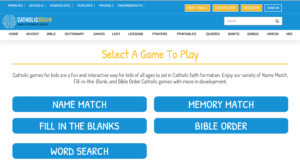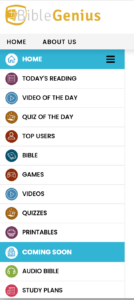Wrestling uninterested kids in catechism classes gave Mosongo Osong an idea for a better way to teach children the Bible — but he had no idea how a coming global pandemic would accelerate his vision and take it beyond Catholic churches.

Mosongo Osong
Osong, who was raised in Cameroon, comes from a devout family. From a young age, his parents thought he might become a priest, but he saw himself as an entrepreneur. That passion led him to launch several medical consulting businesses after moving to the United States and graduating from the University of Texas at Dallas.
“These businesses were very successful, but I wasn’t passionate about it,” he said. “I was searching for my purpose. So I started praying and asking the Lord how to use my talent and serve the church.”
He got the answer one day while teaching second- and third-graders catechism at his parish. “I saw that the kids were not engaged,” he explained. “We were giving them books. At school they are used to technology, then they come to faith formation classes and get so bored.”
He started bringing his own videos to the classes, using his own laptop because the church didn’t own enough appropriate technology. “I started to see how the kids were so happy. And then I started thinking we need to improve this.”
That’s the origin story for CatholicBrain.com, the website he created to teach Catholic children catechism and basic Bible stories, Sunday school lessons and more.
Like so many technology stories, this one began with a platform that seemed right for the time but ultimately missed the mark. In 2014, his company began selling BibleZon, a tablet preloaded with lessons and games and videos. They sold about 15,000 tablets, but that wasn’t enough to sustain the costs of creating the content.
“It was a tough market,” Osong said. “The schools said, ‘We already have devices.’ So we decided to take all the content and put it online.” And that’s when things began to take off. The transition from tablet to online content took about nine months to complete in 2017, and the second step of launching an app for smartphones and tablets was just completed weeks ago.
Then came COVID-19, which forced schools and churches to shut down in-person meetings and left ministers and families scrambling for ways to continue faith formation for children.
“Every Catholic church is now looking for an online platform,” Osong said. “Publishers didn’t have anything in place; they’re only selling books. We were the only company out there with something already online.”
 As a result, subscriptions to CatholicBrain increased by 70% in just three months this spring. Currently, about 600 schools and parishes use the website, and Osong predicts that will increase to 1,000 by the end of this year. Families also are able to purchase subscriptions if their parish doesn’t provide access.
As a result, subscriptions to CatholicBrain increased by 70% in just three months this spring. Currently, about 600 schools and parishes use the website, and Osong predicts that will increase to 1,000 by the end of this year. Families also are able to purchase subscriptions if their parish doesn’t provide access.
“We were in the right place” when the pandemic hit, he admitted. “Most churches were looking for free resources, so we gave out 30-day free trials. Our website traffic increased from 10,000 to 40,000 weekly. Our site actually crashed because of the heavy use.”
A portion of those free trials converted into paid subscriptions, and Osong predicts more will come back online this fall as churches and schools do not fully reopen for in-person learning.
“A majority of the churches are not going to do in-person faith formation classes this fall,” he said. “They are looking for other ways.”
Now, he has created a second company that will take what he has learned teaching Catholic children and apply that to the broader Christian community.
“I have the technology, and it can work for any church,” he said. “I believe in all Christians. I want to serve everybody.”
 The new site, BibleGenius, will launch around Sept. 1, although Osong currently is enlisting churches to participate in beta testing of the site. “This is the same concept as CatholicBrain, but for every Christian church,” he explained.
The new site, BibleGenius, will launch around Sept. 1, although Osong currently is enlisting churches to participate in beta testing of the site. “This is the same concept as CatholicBrain, but for every Christian church,” he explained.
Content on the new site will be “really focused on Bible study,” he said, and will include 500 Bible videos, an audio Bible, animation, games, quizzes, lesson plans and downloadable resources. “Churches can use this as virtual Sunday School.”
As part of the plan to appeal to a wider Christian audience, the read-along Bible components will be offered initially in four English translations: New Living Bible, King James Version, New American Bible and Revised Standard Version.
Content will be available to access as users desire, either in sequence or ala carte. One option will be to study the Bible from creation to Revelation. Kids also will earn points and badges for completing daily Bible readings.
Initial pricing will run from about $3 per month for an individual family to $99 per month for a church group access plan.
Osong realizes he was uniquely prepared to respond to the pandemic because of his native online platform; he’s not having to adapt traditional printed curriculum as most publishers would.
Various other options exist online for children’s church services or for downloadable curriculum. One English theater troupe has created online video Sunday school lessons for kids at Virtual Sunday School. Lifeway Christian Resources, the publishing arm of the Southern Baptist Convention, has created a temporary series of online video lessons for families to use together at home. The Gospel Project has adapted its homeschool curriculum for families to use for Bible study at home during the coronavirus. Group ministry resources now offers its children’s Bible study curriculum in an online version that includes downloadable materials.
BibleGenius differs from all these because it is not worship driven, not musically driven, not adapted from printed curriculum.
“If I launch this one successfully by Sept. 1, this is going to fly,” he said. “I want to be ready.”
